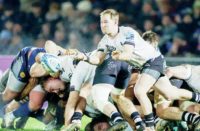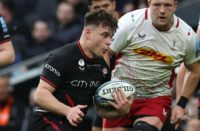 During last week rugby was a bit like the Clint Eastwood film, The Good, The Bad And The Ugly.
During last week rugby was a bit like the Clint Eastwood film, The Good, The Bad And The Ugly.
The Good was England's performance during the first Test and Stuart Lancaster's selections for the second.
Each time the All Blacks are run close in a game there are headlines proclaiming that at last their aura of invincibility is diminishing rather than crediting the opposing teams.
Last week's game saw what many had described as a ‘second rate' England side push the mighty All Blacks all the way to the final play of the game.
The failure of the All Blacks to put 50 points on this ‘second rate' England team was seen by many as an underperforming All Blacks struggling to win against a plucky England team that played above themselves – but nothing could be further from the truth.
Although this established All Blacks team were playing their first game for some time, it was the first time that this particular England team had ever taken to the field, thereby making their performance something special and despite the impression given in the media it was a good team, even on paper.
That said, it's highly possible that this tour will end in disappointment as a resurgent All Blacks, playing at home, will probably eventually hit their stride.
There is something about the All Blacks that makes the teams that face them expect to lose – and not just the players. Even match officials always seem to cut the Blacks a bit more slack than their opponents.
It may be the fact that over the past 108 years they have won 363 (a win ratio of nearly 77 per cent) of the 483 Tests they have played, but I think it's more than that.
The results don't tell the whole story, a story that is more about a style and technique in play, ambition and execution than just mere results, a culture that embodies the hopes and dreams of all the peoples of that island nation.
It raises a level of expectation every time they take the field that we are going to see something special. From the moment they start the Haka to the final whistle, presumption of victory is high, so to see a close game is tantamount to them losing.
More Good was Lancaster's selection in not making wholesale changes for the second Test as this sent out the right message to his squad, particularly as the performance last week was as good as any this season.
Lancaster now has the makings of a squad that he can take to the World Cup with a confidence that they will at least be competitive and, with a few additions and a bit of luck, could even win.
The Bad, and I hate to say it, was the standard of refereeing by one of the world's best referees Nigel Owens. Hard to believe but it would seem that Owens had bought into the belief that the All Blacks
can do no wrong and failed to deliver the one thing that all players need, and should expect, from the match official, consistency.
The much-documented failure to act against Ben Smith and Ma'a Nonu by Owens while sin-binning Marland Yarde in the dying minutes of the game for a similar offence to that of Smith, may not have changed the outcome – but there is a suspicion and a possibility that it just might have.
Both the New Zealand incidents took place in the first half when both sides were still finding their feet and could have given England the numerical advantage when they were in the ascendancy.
Owens' errors were not confined to England. He whistled early when Victor Vito was held up, despite the fact the All Blacks had recycled the ball knowing he hadn't scored and attacked again to cross the line. But they were called back because Owens had whistled too early.
Refereeing is a hard job and sometimes people can have an off-day. Let's hope that this tour is not decided by whether a referee is having a good or bad day.
Another Bad is the IRB's call for the ‘star' players from the 15s game to be included in the Olympic Sevens squads at the expense of the regular Sevens specialist players.
The short-sighted vision of IRB chief executive Brett Gosper in saying that for the Olympic dream to succeed the Unions should include the big star names from the 15s game is completely missing the point.
The idea of having Sevens in the Olympics rather than 15s is to broaden the games appeal to countries that would never make the grade in the full game.
The IRB Sevens circuit already has a following in many countries not known for their 15-a-side game but they have ‘stars' of their own.
Surely the idea is that new stars will be made in a new contest that encompasses more countries than the RWC ever could.
If the Olympic vision is to work, it must also include the possibility of a country from outside the foundation Unions winning the gold, with attractive evenly-matched games between all nations, ‘stars' or not.
The Ugly is the continual ongoing saga of concussion and the potential damage it could do, not just to players but also the game.
I wrote an article a few weeks ago expressing my concerns that more had to be done to research the potential for long term brain damage caused by concussion in rugby and that any conclusions should be made public so that all can make informed choices before playing.
I also believe that it is beholden on the IRB and International Rugby Players' Association (IRPA) to set up a fund to help in research and care for all players proven to be affected as a result of playing.
There should be an immediate study to see if any modern practices in the professional game (like Rugby League-style tackling) are making the incidences of serious concussion more prevalent and if so, make the necessary changes to outlaw those practices.
Having said that, the Ugly drip, drip, of concussion stories in the media is having a corrosive effect on the game.
All efforts should be made to stop any further reports until the evidence is investigated and available so that steps can be taken to make our game as safe as possible for all.
*This article was first published in The Rugby Paper on June 15.




























Pingback: jarisakti